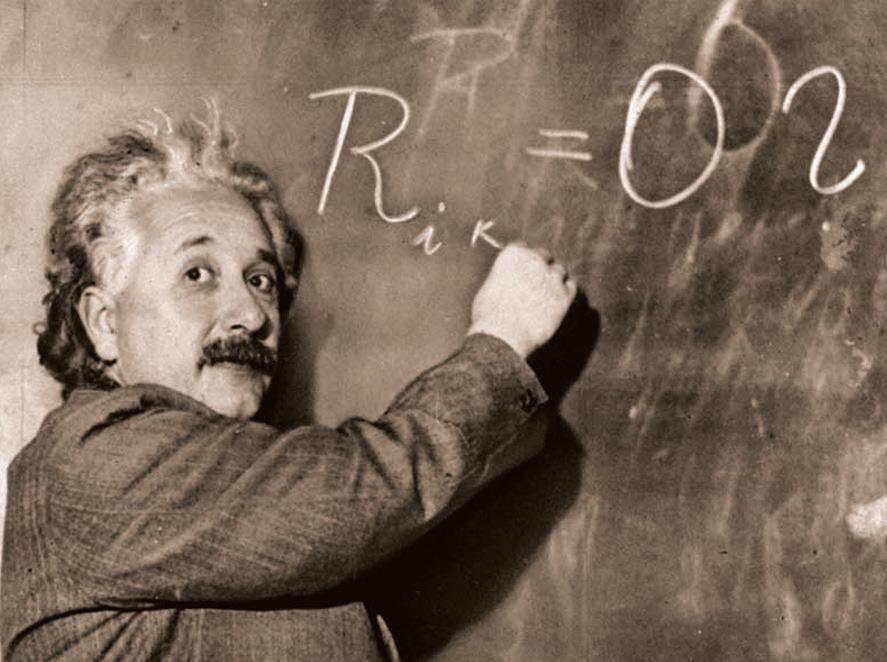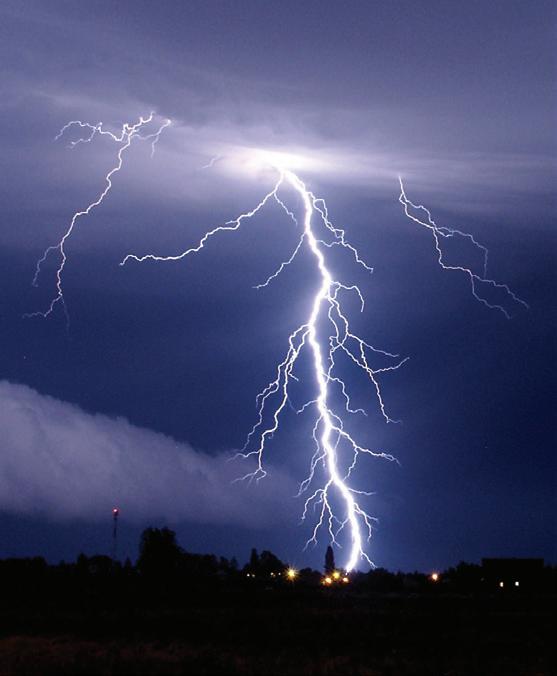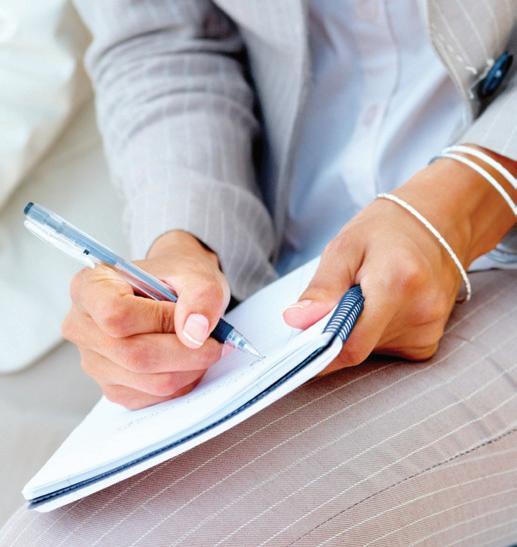
13 minute read
Albert Einstein
28
Before you read the biographical notes, answer these questions.
Advertisement
• Albert Einstein is famous for a number of reasons. Can you mention any of them? • What is his best-known accomplishment? • Look at his photo. How would you describe his appearance?
READING
The 20th century produced many great minds. Albert Einstein clearly stands out as the greatest of all. The name of this absent-minded professor with piercing eyes, wild hair, an extraordinary, brilliant mind and engaging humanity became a synonym for genius. Time magazine named him as the Person of the Century at the end of 1999. Einstein, (born in Germany in 1879, died in the USA in 1955) developed the theory of relativity which became a basis for spectacular technological developments in many fields, including gravitation and the study of the cosmos.
In 1921, he received the Nobel Prize in Physics. In 1933, he went to the United States where he spent his later years. Now you are going to read a true anecdote about Albert Einstein and his theory of relativity.
Track 6 EINSTEIN’S CHAUFFEUR
Albert Einstein used to tour the various Universities in the United States, giving lectures onhis famous theory wherever he went. He was always accompanied by his faithfulchauffeur, Harry, who attended each of these lectures and sat in the back row. One fine day, while Einstein was getting into his car after finishing a lecture, Harry said to him, “Professor Einstein, I’ve heard your lecture on Relativity so many times. If I ever have the opportunity, Iwill be able to deliver it perfectly myself!” “Very well,” replied Einstein, “I’m going to visit Dartmouth next week. They don’t know me there. You can be Einstein and give the lecture, and I’ll be Harry!”
And that is what happened. Harry gave the lecture perfectly, while Einstein sat in the driver’s uniform in the back row pretending to be his chauffeur and enjoying a snooze for a change. Just as Harry was walking off the stage, however, one of the students stopped him and began to ask him a question on the theory of relativity.... one that involved a lot of complex calculations and equations. Harry replied, “The answer to this question is very simple! In fact, it’s so simple that I’m going to let my chauffeur answer it!”
Glossary
absent-minded– being so lost in thought that you are forgetful or preoccupied piercing – sharp snooze – a short, light sleep; nap equation – a mathematical statement saying that two amounts or values are the same
COMPREHENSION
1 Answer the following questions. 1. Why did Einstein travel across the USA? 2. How did it happen that Einstein’s chauffeur was able to deliver the lecture? 3. What was Einstein doing while his chauffeur was delivering the lecture? 4. Was Harry confused by the student’s question?
2 Make questions for the following answers. 1. He received the Nobel Prize in Physics. 2. In 1933. 3. On his theory of relativity. 4. After finishing a lecture. 5. In the back row. 6. He delivered the lecture perfectly. 7. When he was walking off the stage.

SPEAKING
Retell the anecdote about Einstein.
VOCABULARY
a c b
1 Explain the meanings of the highlighted words and choose a word or phrase from the list below that is a synonym for each of them. There is one word more than you need.
include give go with loyal organize to be present
2 Use the following words in the correct form to complete the sentences.
snooze faithful attend accompany pretend spectacular
1. My grandfather often ____________ in front of the television. 2. If you _______________ someone, you go somewhere with them. 3. I want all the students to ____________ this lecture. 4. His ______________ old dog accompanied him everywhere he went. 5. We admired the _______________views of the lake from the house. 6. She isn’t really hurt – she is only _______________.
29
30
3 Use the correct preposition. 1. He delivered lectures _______ his famous theoryof Relativity. 2. He was accompanied ________ his chauffeur. 3. He used to sit _______ the back row. 4. Let’s go out _______ a change. 5. He replied _________ the assistant. 6. He died _______ a heart attack.
4 Complete the collocations (1-12) to describe some facial features. Choose the most suitable words from the box. Sometimes more than one answer is possible. Use your dictionary if necessary.
eyebrows bone structure eyes cheeks/cheekbones jaw lips nose skin smile teeth dimples forehead eyelashes face
1. high cheekbones 2. a big __________ 3. full __________ 4. tender __________ 5. a square ________ 6. smooth ________ 7. piercing ________ 8. a gentle ________ 9. long __________ 10. arched __________ 11. strong __________ 12. a turned-up __________
5 Think about people that you know with expressive features and interesting faces.
Describe them to the class. Try to use the collocations from Exercise 4.
PHRASAL VERBS
The combination of verbs and prepositional or adverbial particles is generally called a phrasal verb, e.g. look after, give up, bring back. The meaning of the words in combination can differ greatly from when they are used independently. − She took the book from my hand. − The plane took off. (left the ground)
PHRASAL VERBS with STAND
1 Study the meanings of the phrasal verbs and do the exercise below.
stand by – to remain loyal to; aid or support stand for – to represent; symbolize stand in – to do someone else’s job for a short time (because the other person is ill or on holiday) stand out – to attract attention; to be very noticeable; to be much better than other similar things or people
2 Complete the sentences using a phrase with the verb stand.
Example: I noticed John immediately because he stood out in the crowd.
1. Everybody in the class admires him because he always _________ his friends. 2. What do the letters BBC ______________? 3. We have lots of good students this year, but one __________ from the rest. 4. The lecturer didn’t turn up, so we had to find somebody who would____________.
PREPOSITIONS OF PLACE
Study the use of prepositions and then do the exercise below.
We use IN with an enclosed space and larger areas (cities, states, countries), e.g. in the kitchen / in the north of England / in Belgrade. We use ON when we talk about a place as a surface or as a line,e.g. on the first floor / on the road to Paris / on the wall.
We use AT when we talk about a particular point, with addresses, with social activities,e.g at the bus stop / at the cinema / at the meeting / at work / at the bottom / at 22, Bond Street. Some common expressions: in the photo/picture, in a queue, in the street, in the sky on the farm/island, on this page, on the beach, on the left at home, at work/school, at the back
Fill in the gaps with the prepositions in, on or at.


1. We spent the whole holiday _______ the beach. 2. There were a lot of people ______ the conference. 3. I’ll meet you _______ the airport. 4. The Smiths now live ______ 23, King Street. 5. I met her _______ Oxford Street the other day. 6. Her house is _______ the right, and the flat is _______ the twenty-first floor. 7. Rob and Paul are ________ the middle of the picture, and their uncle is _______ the left. 8. He is sitting ________ an armchair, and his guitar is _______ a small chair. 9. Portsmouth is a town _________ the south of
England, and it is ________ the coast. 10. My son is not ______home; he is _______ school.
31
32 GRAMMAR
THE PAST CONTINUOUS TENSE
Here are the basic uses of the past continuous tense:
1. to describe actions in progress over a period of time or a particular
time in the past. We often use all toemphasize continuity. He was working on his essay all night. I was having dinner at 8 o’clock yesterday.
2. to express an activity which was in progress when something else happened.
We often use conjunctions:when, as, while
We were sleeping when the phone rang.
3. to express two or more parallel actions.
While I was working in the garden, my wife was cooking. For more information, see the Grammar summary .
PRACTICE
1 Use the verbs in the box in the past continuous to complete the sentences below.
get talk do rain stand have
1. The children started fighting while their mother _______________on the phone. 2. We ________________________ supper when we heard thunder. 3. It __________________________ hard all day yesterday. 4. Just as I _______________ to an interesting part of the story, the doorbell rang. 5. What ________you ___________when the storm started? 6. They __________________ around Michael when I entered the classroom.

2 Use the verbs in brackets in either the past simple or the past continuous form to complete the sentences.
1. He ________________ (watch) TV when the phone _______________ (ring). 2. He _______________(turn) down the sound and ______________(go) to answer it. 3. You looked very busy when I __________ (see) you last night. What ___________ (you/do)? 4. He __________________(not/allow) us to go out in the boat yesterday as a strong wind ____________________(blow). 5. When I first ____________ (meet) him a few years ago, he ________________(work) in a bank. 6. While we_________________ (work) in the garden, someone ______________(come) to the house and _______________ (leave) this note.
3 Complete the conversational exchanges. 1. A: I bought a new dress yesterday. (How much/cost?)
B: ________________________________________

2. A: I was talking to Sandra when Alice came in. (What/talk about?)
B: ________________________________________ 3. A: We finally answered all those letters last night. (What time/finish?)
B: ________________________________________ 4. A: I saw your sister at the party last night. (What/she/wear?)
B: ________________________________________ 5. A: I saw something strange when I was walking home yesterday evening. (What/see?)
B: ________________________________________
PAST HABITS
USED TO and WOULD
Used to is used to express past facts or past habits. He used to live in that house. I used to smoke a lot, but fortunately, I don’t smoke any more. Would can also be used in place of used to to talk about regular activities or habits in the past, but it is not used for states. He would always bring flowers when he came to visit me.
PRACTICE
1 Role play – Past habits Student A asks a question with used to and the verb given and student B gives true answers. Talk about your past habits (when you went to primary school, kindergarten, etc). Use the following words/expressions: play, go to bed, hobby, learn, collect, do after school/in the evening. Example: A: Where did you use to play when you were eight years old? B: I used to play in the nearby park.
2 Rewrite the sentences below in your notebook using would or used to. Examples: When she came to Belgrade, we went to the cinema together. When she came to Belgrade, we would/used to go to the cinema together. When I was a child, we lived in the country. When I was a child, we used to live in the country. (You can’t use would for states.)
1. He wrote to me when we were students, and then stopped. 2. When she was in the fifth grade, she often went to school by bike. 3. My father is a teacher now, but he worked as a journalist after his graduation. 4. She always handed her tests in first when we were at secondary school. 5. When she was young, she liked to criticize her brother, but now she admires him.
33
34 THE POSSESSIVE FORM
Look at these sentences: 1. Einstein’s chauffeur attended each of the scientist’s lectures sitting in the back row. 2. Einstein put on the driver’s uniform and sat in the back row.
1. We express possession by adding…
• an apostrophe + s after a singular noun or plural noun not ending in -s: Jane’s bedroom, the children’s playground. • only an apostrophe after a plural noun ending in -s: my two boys’ school. 2. The possessive ’s structure is used to talk about something that belongs to a particular person (Kate’s hair), group of people (Mary and Peter’s son), country or town (London’s traffic), or animal (the cat’s tail).
It is also used with personal indefinite pronouns (someone’s glasses), in some expressions of time (yesterday’s newspaper; in two weeks’ time) or in phrases of place (at the butcher’s).
3. Double possessive
…of…+ possessive ’s
Kate is a friend of Nathan’s. (One of Nathan’s friends)
PRACTICE
Complete the sentences using the words in brackets with the Saxon genitive. 1.Have you seen ______________________________ (latest film/Tom Cruise)? 2.We are planning _______________________________ (holiday/two weeks). 3.The teacher spoke to ____________________________ (parents/the boy). 4.We got a letter from _______________________ (cousin/our friend) who lives in Australia. 5.I found __________________________________ in the street.(wallet/somebody)
LISTENING Track 7 Sean Connery as James Bond 1 Pre-listening activity 1. Have you seen any James Bond films? Did you like them? Why/Why not? 2. Who played the role of Bond in those films? a. Sean Connery b. Roger Moore c. Daniel Craig d. other actors
2. You are going to listen to how Sean Connery became famous as the first actor who said: ‘My name is Bond. James Bond’.
3 Listen to the text once again and complete the sentences. 1. Sean had to work at an early age because ___________________________________________. 2. He couldn’t stay in the Navy _____________________________________________________. 3. Connery became a star playing ___________________________________________________. 4. Goldfinger became a huge hit because of_____________________________________________. 5. The money he earned from Diamonds Are Forever was donated _________________________.
WRITING
1 Use the notes below to write a biography of Albert Einstein (1879-1955). Add as many words as you need to connect the information and years provided. You may include any other relevant information about Albert Einstein that you think is important. Organize the information in chronological order.
the German-American physicist / the greatest physicist of all time 1879 born into a Jewish family in Ulm, Germany 1885 began his schooling in Munich 1894 the Einstein family moved to Italy 1896 studied Physics and Mathematics in Switzerland / graduated at age 17 / met Mileva Marić (the only woman studying Mathematics) 1903 married Mileva Marić / had a daughter and two sons 1905 obtained his doctor’s degree 1914 lived in Berlin 1919 divorced / married again the same year 1921 awarded the Nobel Prize in Physics 1933 emigrated to America for political reasons / worked at Princeton University gained numerous awards E.g.Albert Einstein is considered to be the most famous scientist of all time. He was born...
COMMUNICATION ACCEPTING AND REFUSING
The following are some of the phrases used for accepting and refusing.
Accepting Refusing
1.Would you like some …? Yes, please. / Sure. Thanks No, thank you. / No, but thanks 2. Would you like to …. Okay. Sounds good. for offering. (go see a movie)? Sure. I’d love to. / Yeah. Good I’m sorry, but I can’t. idea. No, but thanks for inviting me.
3. How about some more… (pie)? All right. Thanks. Looks good. Thanks. No, thanks. I’m really full. Thanks anyway.
4. How about going … (skiing this weekend)? Sounds like fun. All right. When and where? Sorry. I’m busy this weekend. I don’t think I can. How about some other time?
PRACTICE
Pair work. With a partner, practise accepting and refusing in the following situations:
A B
1. Here. Have a cookie. 1. Oh, _____________________ 2. How about a glass of wine? 2. No, _____________________ 3. How about going for a nice walk? 3. Well, ____________________ 4. Can I get you a drink? 4. Sure, ____________________ 5. Why don’t we have some Chinese food? 5. All right. _________________ 6. Why don’t you come with your sister to my party? 6. Sorry, ____________________ 7. Would you like to go to the museum with us? 7. Okay, ____________________






